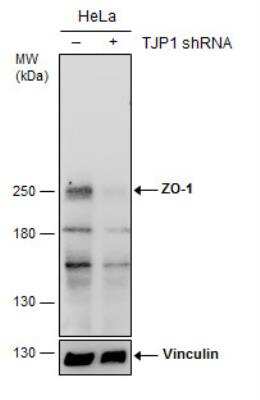Tight Junction Protein 1 Antibody
Novus Biologicals, part of Bio-Techne | Catalog # NBP2-21051

Key Product Details
Validated by
Knockout/Knockdown
Species Reactivity
Validated:
Human, Rat
Predicted:
Canine (100%), Mouse (99%). Backed by our 100% Guarantee.
Applications
Immunocytochemistry/ Immunofluorescence, Western Blot
Label
Unconjugated
Antibody Source
Polyclonal Rabbit IgG
Concentration
Concentrations vary lot to lot. See vial label for concentration. If unlisted please contact technical services.
Product Specifications
Immunogen
Recombinant protein encompassing a sequence within the center region of human ZO-1. The exact sequence is proprietary.
Localization
Cell membrane; Peripheral membrane protein; Cytoplasmic side; Cell junction; tight junction
Marker
Intercellular Junctions/Tight Junction Marker
Clonality
Polyclonal
Host
Rabbit
Isotype
IgG
Theoretical MW
195 kDa.
Disclaimer note: The observed molecular weight of the protein may vary from the listed predicted molecular weight due to post translational modifications, post translation cleavages, relative charges, and other experimental factors.
Disclaimer note: The observed molecular weight of the protein may vary from the listed predicted molecular weight due to post translational modifications, post translation cleavages, relative charges, and other experimental factors.
Scientific Data Images for Tight Junction Protein 1 Antibody
Western Blot: Tight Junction Protein 1 Antibody [NBP2-21051] - Various whole cell extracts (30 ug) were separated by 5% SDS-PAGE, and the membrane was blotted with ZO-1 antibody [N2C1], Internal diluted at 1:2000. The HRP-conjugated anti-rabbit IgG antibody (NBP2-19301) was used to detect the primary antibody.
Immunocytochemistry/Immunofluorescence: Tight Junction Protein 1 Antibody [NBP2-21051] - Tight Junction Protein 1 Antibody Sample: A431 cells were fixed in ice-cold MeOH for 5 min. Green: TJP1 protein stained by ZO-1 antibody, Internal diluted at 1:500. Blue: Hoechst 33342 staining.
Western Blot: Tight Junction Protein 1 Antibody [NBP2-21051] - Non-transfected (-) and transfected (+) HeLa whole cell extracts (30 ug) were separated by 5% SDS-PAGE, and the membrane was blotted with ZO-1 antibody [N2C1], Internal. HRP-conjugated anti-rabbit IgG antibody was used to detect the primary antibody.
Applications for Tight Junction Protein 1 Antibody
Application
Recommended Usage
Immunocytochemistry/ Immunofluorescence
1:100-1:1000
Western Blot
1:500-1:3000
Formulation, Preparation, and Storage
Purification
Immunogen affinity purified
Formulation
PBS (pH 7), 20% Glycerol
Preservative
0.025% Proclin 300
Concentration
Concentrations vary lot to lot. See vial label for concentration. If unlisted please contact technical services.
Shipping
The product is shipped with polar packs. Upon receipt, store it immediately at the temperature recommended below.
Stability & Storage
Aliquot and store at -20C or -80C. Avoid freeze-thaw cycles.
Background: Tight Junction Protein 1
Alternate Names
DKFZp686M05161, MGC133289, Tight junction protein 1, tight junction protein 1 (zona occludens 1), tight junction protein ZO-1, TJP1, ZO1, ZO-1, zona occludens 1, Zona occludens protein 1, zonula occludens 1 protein, Zonula occludens protein 1
Gene Symbol
TJP1
UniProt
Additional Tight Junction Protein 1 Products
Product Documents for Tight Junction Protein 1 Antibody
Product Specific Notices for Tight Junction Protein 1 Antibody
This product is for research use only and is not approved for use in humans or in clinical diagnosis. Primary Antibodies are guaranteed for 1 year from date of receipt.
Loading...
Loading...
Loading...
Loading...
Loading...
⚠ WARNING: This product can expose you to chemicals including mercury, which is known to the State of California to cause reproductive toxicity with developmental effects. For more information go to www.P65Warnings.ca.gov.



